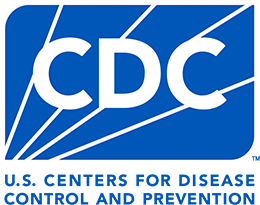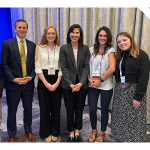By Katie Hannon Michel, Becca Rieckhoff & Jami Crespo
Congratulations to seven teams who recently completed their participation in our yearlong Legal Epidemiology Learning Cohort! Supported by the Office of Public Health Law Services within the Centers for Disease Control and Prevention’s Public Health Infrastructure Center and by ChangeLab Solutions, the learning cohort is designed to enable any health department or organization to build its capacity to carry out legal epidemiology projects, even with minimal previous experience or skills. Legal epidemiology is a scientific approach to tracking laws and policies of public health significance in order to explore their impact and effectiveness.
The teams in the 2023–2024 cohort included members from state and local health departments, nonprofit public health organizations, community-based organizations, and academic institutions. Each team participated in a series of trainings and online discussions with peers from around the country and received one-on-one technical assistance from CDC staff on best practices in legal epidemiology. With this support, they carried out projects to help address fundamental drivers of health inequity in their communities, including projects focused on land use, public health data sharing, minimum wage preemption, water and food safety regulation, maternal and infant health, and access to ballot initiatives. Read on to learn about the work of this year’s teams!
Clark County, Washington: Easements to Protect Agricultural Land
The team from Clark County, Washington, included representatives from the Western Institute for Agriculture and Food Security, LLC, and Clark County Public Health’s healthy communities division, where participants’ roles spanned policy, epidemiology, strategic initiatives, and urban planning. The team studied how conservation easements are used at the county level in Washington to protect agricultural land and whether these easements improve access to farmland for underserved agricultural producers. The team also explored how the presence and power of agricultural advisory bodies in counties with Conservation Futures programs affect use of county property tax funding for agricultural land conservation.
The team selected their research topic after engaging with local advocates and community-based organizations, who identified access to farmland as a significant barrier to entry for new farmers in Washington, particularly farmers of color. The team noted that land access can affect farmers’ economic security, which is a key determinant of health, and that land stewardship plays a critical role in climate change mitigation and resilience.
The team plans to use the information they gathered to inform county efforts related to agricultural advisory bodies, comprehensive planning, and community health assessment and improvement. The information will also inform statewide efforts of the overall Conservation Futures program, including Clark County’s implementation of the program through their Legacy Lands program.
Council of State and Territorial Epidemiologists: Tribal Public Health Data-Sharing Policies
The Council of State and Territorial Epidemiologists (CSTE) team included a public health attorney, two senior program analysts, and the State Epidemiologist from the Virginia Department of Health’s Office of Epidemiology. The team researched and analyzed how laws in six states (Alaska, California, Florida, New Mexico, Oklahoma, and South Dakota) enable or prohibit the sharing of identifiable health information between state health departments and tribal public health authorities, including tribal nations and tribal epidemiology centers (TECs).
In developing their research focus, CSTE highlighted the authority of tribal nations and TECs to take action to protect public health. They also emphasized how access to identifiable health information and other data can affect such entities’ ability to fulfill their public health responsibilities. The team aimed to understand what laws exist that define and address public health authority status, identifiable health data, and data sharing for public health purposes.
By examining relevant public health laws, the CSTE team developed a better understanding of legal epidemiology methods and what laws enable or prohibit sharing of identifiable health information between state health departments and overlapping tribal public health authorities in the six states included in the legal dataset.
Kansas: State Preemption of Local Minimum Wage Laws
The Kansas team included representatives from the University of Kansas Medical Center, the Kansas Health Institute, and local health departments, including the Johnson County Department of Health and Environment, the Wyandotte County Public Health Department, and Lawrence-Douglas County Public Health, which together serve three of the five most populous counties in Kansas. Team members’ roles spanned policy, strategy, and analysis; disease investigation; population health management; epidemiology; and informatics. The team members used the cohort opportunity to investigate the health impacts of state-level laws that preempt localities from adopting policies related to minimum wage.
The team noted that the COVID-19 pandemic highlighted how Kansas’s state law preempting local minimum wage policies and local paid sick or family leave policies exacerbated the disproportionate effects of the public health emergency on historically underserved populations. Further, the team acknowledged that economic stability — an objective of the US Department of Health and Human Services’ (HHS’s) Healthy People 2030 — has a significant effect on population health in their jurisdictions. This reality was underscored by data on poverty and income in community health assessments produced by Lawrence-Douglas County, Wyandotte County, and Johnson County.
As a part of their project, the team leveraged their connection with Stand Up KC — a local organization in Kansas City that represents fast-food and retail workers and advocates for a living wage — to conduct key informant interviews exploring how minimum wage affects Kansas residents. Interviewees highlighted that minimum wage commonly affects individuals’ ability to access transportation, health care, and nutritious food.
The Kansas team hopes to use the information they gathered to inform policy changes that can improve Kansans’ health and economic security. The team would also like to use their legal epidemiology skills and training to address other topics related to health equity in their state.
Lincoln Trail District Health Department, Kentucky: Water Testing Requirements for Private Wells
Team members from the Lincoln Trail District Health Department (LTDHD) — including community epidemiologists, the health impacts administrator, and the chronic disease prevention manager — studied state-level water testing requirements for private wells.
The team’s interest in water regulation for private wells was spurred by the construction of lithium battery manufacturing facilities in Hardin County, Kentucky (a jurisdiction served by LTDHD). A recent environmental and health impact assessment conducted by a student at the University of Kentucky found that the construction and operation of the facilities could contaminate nearby soil and water and negatively affect health. The team noted that low-income and underrepresented communities often face disproportionate burdens of exposure to environmental pollution. As a part of their project, the team has engaged community members in order to learn more about their awareness of private well-water testing and to educate them about applicable regulations and the impact of water contamination on health and safety.
The team plans to use the legal data they have collected to explore potential correlations between well-water testing requirements and bladder cancer rates, and they may expand their dataset and health impact evaluation in the future. The team also plans to use their legal epidemiology skills to inform conversations about how laws affect health and to support evidence-based policy development to reduce rates of chronic disease among Kentucky residents.
South Carolina: Laws Regulating the Transportation of Neonates
The team from the South Carolina Department of Health and Environmental Control (DHEC) explored the health impacts of laws governing the transportation of neonates (a term that they defined as infants under the age of 28 days for purposes of their research). The DHEC team included in-house legal counsel, an epidemiologist, a surveillance coordinator, the deputy director of the Bureau of Maternal and Child Health, the director of the Bureau of Chronic Disease and Injury Prevention, and a law student and an undergraduate student from the University of South Carolina.
The DHEC team sought to focus on an issue within DHEC’s scope of authority, with the goal of providing more robust guidance for DHEC’s regulatory work as a state agency. Transportation of neonates is a topic of particular interest to the DHEC team because the infant mortality rate in South Carolina has been higher than the US average in recent years. After completing their background research, the team conducted a 50-state scan of laws that address maternal and neonatal transport. Their research focused specifically on events that mandated transfers, hoping to gain insight into states’ approaches to determining the appropriate level of care for neonates. The recent passage of relevant legislation in South Carolina and an increased emphasis on maternal and neonatal safety create the potential for these findings to be impactful and beneficial throughout the state. Not only has the team developed a greater understanding of the regulatory framework outside of South Carolina, but these results may provide evidence-based suggestions and models for other states to emulate.
Going forward, the DHEC team plans to use their expanded legal epidemiology skills and capacity to study the health impacts of laws and policies and to inform agency action. The team continues to analyze and interpret the findings from their 50-state scan and plans to disseminate their work.
Two Rivers Public Health Department, Nebraska: Food Safety Requirements
The Two Rivers Public Health Department (TRPHD) team included the department’s health director, its planning section supervisor, and an epidemiologist, who partnered with contract attorneys. TRPHD is the largest rural health department in Nebraska, serving residents across a seven-county area in south central Nebraska.
TRPHD joined the cohort while developing an environmental health program, and they identified food safety as a key focus, given TRPHD’s authority to regulate food establishments. Through background research conducted as a part of their project, the TRPHD team explored whether local control of food safety certification and inspection lead to better health outcomes when compared with centralized or state-led processes. The TRPHD team also sought to identify key components of successful food handling certification and inspection programs.
Looking ahead, TRPHD has identified several potential opportunities to use legal epidemiology to explore key social determinants of health. The TRPHD team hopes to use their expanded legal epidemiology skills and capacity to inform regulatory changes that can promote health equity.
Wisconsin Department of Health Services: Access to Ballot Initiatives
The Wisconsin Department of Health Services (WI DHS) team included members whose roles span policy, state health plan coordination, and epidemiology, as well as an intern from the University of Wisconsin who contributed legal research skills and a Wisconsin Population Health Service Fellow who supported the drafting of the final research brief. The team systematically mapped features of state-level ballot initiative laws in Midwestern states, focusing on different types of ballot initiatives and associated signature requirements (including requirements for number of signatures, geographic distribution of signatories, and time allowed to gather signatures), which can influence the ability of citizens to get an initiative on the ballot.
The team selected this topic in part because civic engagement and representation are components of social connectedness and belonging, a priority area for the Wisconsin State Health Improvement Plan. The 2020 State Health Assessment (SHA) highlighted the importance of civic engagement and participation to health and well-being in Wisconsin. Following the SHA, WI DHS engaged community-based organizations and public health system partners, who reiterated the importance of participation in decision making as a key way for communities to develop a sense of belonging. Civic participation has also been identified as a social determinant of health in HHS’s Healthy People 2030.
WI DHS intends to use the results of their analysis to educate stakeholders on how health is connected to civic participation and representation as well as to help identify potential ways to improve health policy for Wisconsin’s most underserved populations. WI DHS also plans to use legal epidemiology to investigate other policies related to civic participation, to better understand their impacts on health. Finally, WI DHS intends to use their insights to support local and tribal public health agencies in changing systems in ways that support public health in their respective communities.
Interested in reading more about the teams? Read a success story recounting lessons learned from our 2023–2024 Legal Epidemiology Learning Cohort.
CDC’s Office of Public Health Law Services and ChangeLab Solutions would like to thank and highlight some of the partners who volunteered their time to present their experiences with legal epidemiology during the 2023–2024 cohort training sessions, including Mike Ellsworth from the Washington State Department of Health, Taylor Ingram from the Louisville Department of Public Health and Wellness, Megan Douglas from the Morehouse School of Medicine, and Megan Todd, Giselle Babiarz, and Benjamin Hartung from the Philadelphia Department of Public Health.
This work was supported by the Centers for Disease Control and Prevention of the US Department of Health and Human Services (HHS) as part of a financial assistance award totaling $200,000 with 100 percent funded by CDC/HHS. The contents are those of the authors and do not necessarily represent the official views of, nor an endorsement, by CDC/HHS or the US Government.
The mark "CDC" is owned by the US Department of Health and Human Services (HHS) and is used with permission. Use of this logo is not an endorsement by HHS or CDC of any particular product, service, or enterprise.
7/11/2024



